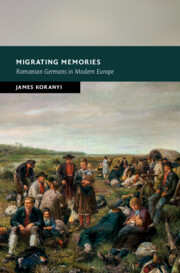
- Publisher:
- Cambridge University Press
- Online publication date:
- December 2021
- Print publication year:
- 2021
- Online ISBN:
- 9781009047449

Romanian Germans, mainly from the Banat and Transylvania, have occupied a place at the very heart of major events in Europe in the twentieth century yet their history is largely unknown. This east-central European minority negotiated their standing in a difficult new European order after 1918, changing from uneasy supporters of Romania, to zealous Nazis, tepid Communists, and conciliatory Europeans. Migrating Memories is the first comprehensive study in English of Romanian Germans and follows their stories as they move across borders and between regimes, revealing a very European experience of migration, minorities, and memories in modern Europe. After 1945, Romanian Germans struggled to make sense of their lives during the Cold War at a time when the community began to fracture and fragment. The Revolutions of 1989 seemed to mark the end of the German community in Romania, but instead Romanian Germans repositioned themselves as transnational European bridge-builders, staking out new claims in a fast-changing world.
‘Emphasizing the multipolar and transnational character of the voices that participated in defining what it meant to be German Romanian, this is an excellent rethinking of the modes of belonging and re-imagining that made up that history from the age of the Habsburg Monarchy through the present.’
H. Glenn Penny - University of Iowa
‘In this fascinating transnational history James Koranyi explores the complex twists and turns of Romanian German identity and memory, always asking who memory-making empowers and what significance claims about the past have for the present and future. An eye-opening insight into how minority groups are shaped by the past.’
Roland Clarke - University of Liverpool
‘James Koranyi’s book is an empathetic, sophisticated and critical history of the Romanian German experience through the turbulent twentieth century. The many layers of the past are fused with contemporary historical and lived experience to reveal a tapestry of identities and understandings. It is a fascinating and stimulating read.’
Jonathan Kwan - University of Nottingham
‘… a welcome addition to the vast body of research on Central and Eastern European nationalities.’
Oleksandra Krushynska Source: German Historical Institute London Bulletin
 Loading metrics...
Loading metrics...
* Views captured on Cambridge Core between #date#. This data will be updated every 24 hours.
Usage data cannot currently be displayed.